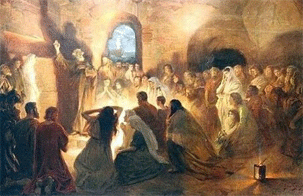Acts 15
 Acts 15 presents to us the New Testament model for conflict resolution particularly in dealing with a doctrinal issue whether circumcision was a necessary requirement for salvation or not.
Acts 15 presents to us the New Testament model for conflict resolution particularly in dealing with a doctrinal issue whether circumcision was a necessary requirement for salvation or not.
When “some men” came to Antioch promoting circumcision as a necessary rite to salvation, defenders of the faith Paul and Barnabas engaged with them “into SHARP DISPUTE and DEBATE” (Acts 15:2).
This was not resolved in Antioch and so the church there sent Paul and Barnabas and some other companions to consult with the apostles and elders at Jerusalem (Acts 15:3), their mission was,
“?go up to Jerusalem, to the apostles and elders, about this QUESTION.”
It is important to note that their reporting was held in the open (not in secret) and Acts 15:4 says to “the church and the apostles and elders.” This should not be confused with their private meeting early on with a few apostles which happened at the onset of their ministry with the Gentiles (Gal. 2:9).
Since the reporting was done in the hearing of the entire church, “some of the sect of the Pharisee” positioned themselves as pro-circumcision.? It was then followed by “much dispute” until Peter got up and declared the collective position of the apostles and the elders saying,
“No! We believe it is through the grace of our Lord Jesus that we are saved, just as they are.” (Acts 15:11)
It was then followed by the Paul and Barnabas? attestation of the miracles and wonders that God has done through them for the sake of the Gentiles (Acts 15:12).
Then there was silence (Gk. sigao, Acts 15:13).
With the arguments obviously ended, James concluded the debate and set into motion the steps that must be taken to ANSWER the question sent before them by church in Antioch to settle the issue once and for (Acts 15:14-21). The Gospel of the God?s grace was upheld now and forever more (cf. Acts 20:24).
Observe that it was James, not Peter, who had the final say. While Peter said, “WE believe?.” It was James who said, “Listen to ME?. Therefore I judge” (Acts 15:13, 19). He must be the PRESIDING ELDER not Peter.
His judgment, as he said, was based on: (a) the testimony and experience of Peter (Acts 15:14) (b) agreement of the Scriptures such as Amos 9:11-12 (see Acts 15:15-18).
His instructions were: (a) not to trouble the Gentiles returning to God (Acts 15:19) and (b) to tell them to abstain from things polluted by idols, sexual immorality, and from things strangled, and from blood (Acts 15:19-21) -? this second directive was given to prevent further conflict with the Jews in cities where Moses? Law was preached every Sabbath.
The WHOLE CHURCH sent Barsabas and Silas to Antioch and Cilicia along with Paul and Barnabas to deliver the answer to their inquiry (Acts 15:22). And after they encouraged the brethren there, they returned to Jerusalem while Silas, Barnabas and Paul decided to stay (Acts 15:32-35).
Some of those who argue for Monarchial Episcopate say Peter was the first Pope. If Peter was the first Pope, how come James had the final say?
Never the less, it was a group decision with the presiding elder setting in motion what the group has collectively agreed, primus inter pares?
Monarchial Episcopate refers to church polity model wherein a single bishop has the spiritual oversight over a geographic area or in the case of some Bible-believing Christians, a denomination.
See the New Testament church polity model in Elders, Deacons and Saints.
Recent Comments